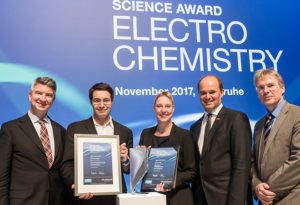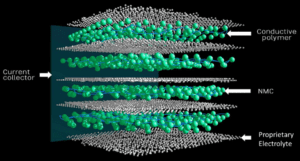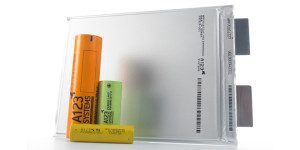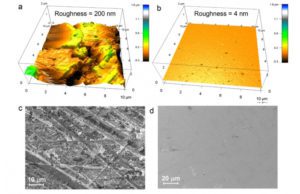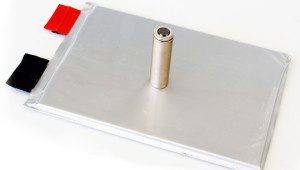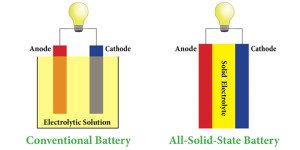Dr. Jennifer Rupp, Assistant Professor of Materials Science and Engineering at MIT, has won the BASF and Volkswagen Science Award Electrochemistry 2017 for her outstanding research results in the area of next-generation energy storage systems. Dr. Rupp’s research focuses on material and electrode designs for solid-state batteries. She explored a novel glassy-type lithium-ion conductor that… Read more »
Search Results Found For: "solid-state"
Fisker files patents on solid-state battery tech
Reborn automaker Fisker has filed patents for a new type of solid-state battery technology that it says could lead to much greater energy density and faster charging times. According to Fisker, current limitations of solid-state technology include low electrode current density, limited temperature ranges and non-scalable manufacturing processes. Other drawbacks include: low power and low… Read more »
A123 invests in solid-state battery tech firm Solid Power
A123 Systems has invested in Solid Power, a developer of solid-state battery technology. Solid Power’s tech combines a high-capacity cathode with a high-capacity lithium metal anode in combination with a high-ionic-conductivity solid separator. The battery materials are 100 percent inorganic, and possess no flammable or volatile components. Solid Power says its batteries provide two to… Read more »
MIT-led study suggests route to improving solid-state batteries
Replacing a liquid electrolyte with a solid electrolyte could offer major advantages for both safety and energy storage capacity, but so far, attempts to develop a practical solid-state cell have run into major obstacles. Liquid electrolytes can be flammable, and are also prone to the formation of dendrites -thin, fingerlike projections of metal that build… Read more »
FDK and Fujitsu develop novel cathode material for solid-state batteries
FDK and Fujitsu Laboratories have jointly developed lithium cobalt pyrophosphate (Li2CoP2O7) as a cathode material for solid-state lithium-ion batteries. The new material can operate at charge/discharge voltages of more than 5 V, which is beyond the limits of current lithium batteries. The energy of a battery is a function of its voltage and capacity, so an… Read more »
UT Austin team developing solid-state sodium or lithium battery cell
Researchers at the University of Texas at Austin have devised a new strategy for an all-solid-state sodium or lithium EV battery cell. In “Alternative Strategy for a Safe Rechargeable Battery,” published in Energy & Environmental Science, noted lithium-ion battery pioneer Professor John Goodenough and his colleagues explain that the cells use a solid glass electrolyte…. Read more »
New interfacial architecture enables high-energy solid-state Li battery
Researchers led by a team from China’s Ningbo Institute of Materials Technology and Engineering have developed stable solid-state lithium batteries with high energy and power densities. In “High-Energy All-Solid-State Lithium Batteries with Ultralong Cycle Life,” published in Nano Letters, the scientists explain how they developed a new interfacial architecture. They say that their design approach… Read more »
Researchers use superionic conductors as electrolytes for solid-state batteries
Researchers at the Tokyo Institute of Technology, in collaboration with Toyota and two other research institutions, have designed and tested solid-state batteries using a novel type of solid electrolyte. In “High-power all-solid-state batteries using sulfide superionic conductors,” published in Nature Energy, Yuki Kato and team members explain the advantages of superionic materials as solid electrolytes…. Read more »
New electrolyte for solid-state batteries combines polymer and glass
Scientists at the DOE’s Lawrence Berkeley National Laboratory have developed a novel electrolyte that addresses many of the problems of solid electrolytes by combining the two primary types – polymer and glass. There are two kinds of solid electrolytes – polymer and glass or ceramic – and each has its own set of challenges. Polymer… Read more »
ARPA-E awards $6.6 million to two projects for solid-state battery electrolytes
The DOE’s Advanced Research Projects Agency – Energy (ARPA-E) has awarded $125 million to 41 energy-related R&D projects under its 2015 OPEN funding program. Two of these have to do with ceramic electrolytes for solid-state EV batteries. A consortium led by the University of Michigan won $3.5 million for a project called “Transitioning Advanced Ceramic… Read more »




